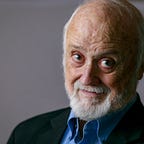Trump as a stressed lame duck
The judges and pardons to come
Contributed by Will Howard
There would be 61 lame-duck days after losing the election, days when President Trump’s lifetime judicial appointments could still be confirmed by the current Senate. For anyone worried about prosecution by a post-Barr Justice Department, it will be tempting to lobby Trump to pack the courts with friendly judges while he can. They would likely become known as the TrumpPack judges.
Judges are also a big issue among religious conservatives, and likely the reason they’ve chosen to hold their noses for so long about Trump’s moral lapses and his repeated dog-whistle promotion of hatred.
Furthermore, there are 78 days from the election until the new President takes office on January 20th, days in which he can do, without needing Senate approval, some things that our 213-year-old constitution did not explicitly guard against.
1. He can pardon himself using the Nixon Escape Maneuver: Resign after reaching a deal with the Vice-President to subsequently pardon him. Pence’s would probably be a blanket pardon like Ford’s: “a full, free, and absolute pardon unto Richard Nixon for all offenses against the United States” during his entire term of office. That might stop federal prosecutions for Trump’s tax problems, which may now (more later) threaten him with personal bankruptcy and jail time, but it would not stop the states’ attorneys general from pursuing him for state tax evasion or fraud. The recent revelations about his income tax returns and shell companies give the AGs many good starting points from which to build a possible case.
2. He can pardon all his helpers — probably after extracting non-disclosure agreements from them. Since the Office of the Pardon Attorney will be overwhelmed with applications, we should expect to see some blanket pardons covering broad classes of people, in the manner of President Carter’s pardoning of Vietnam-era draft dodgers.
3. While lame-duck Executive Orders and hasty Regulations could be eventually set aside after he leaves office on January 20th, they might cause a lot of money to be shifted and irreversibly spent in the meantime as Trump creates some favors from which he expects payback. Watchdogs will need to be alert for disguised Trumpian deals, where someone gets a noncompete government contract in return for a promise of legal expense money, to be sent later via shell companies to the ex-president’s lawyers.
An example of the latter technique is Mr. Trump’s 2016 use of shell companies to hide a $21 million transfer from a casino mogul (that’s also Mr. Trump’s former occupation, which he successfully papered over with his brand-name business). Now we know that early in 2016, Mr. Trump had unexpectedly been denied a big personal loan from his favorite bank because of his financial condition, making Trump’s self-funded campaign short on cash to pay for the home-stretch media blitz he had reserved.
The casino cash infusion into Trump’s 2016 campaign was part of a last-minute attempt to conceal from the voters that Mr. Trump wasn’t really the successful billionaire he claimed to be.
WILL HOWARD (a pen name) is, under his own name, the author of many nonfiction books; they have been translated into 16 languages. He was, however, able to supply an author picture, dated 1955.
In 1955 the real author looked nothing like he does 65 years later, making this image worthless for identifying “Will Howard”.
The more recognizable person is President Harry S Truman.
Credit: The LIFE magazine photographer Eliot Elisofon took the picture; “Will Howard” was his fetch-and-carry assistant.
The author gives you permission to copy and re-publish this essay: 2020 CC BY.
